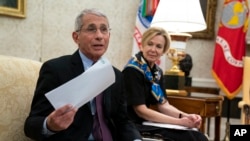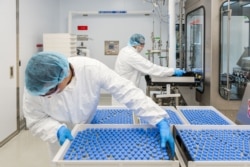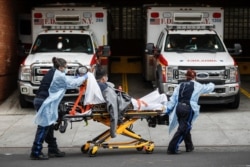An experimental drug has proven effective in treating COVID-19 patients, the head of the U.S. National Institute of Allergy and Infectious Diseases, Dr. Anthony Fauci, announced Wednesday.
“Remdesivir has a clear-cut, significant positive effect in diminishing the time to recover,” Fauci told reporters in the White House Oval Office. “A drug can block this virus.”
An international randomized placebo control trial at his institute started February 21 with hundreds of hospitalized coronavirus patients, Fauci said.
Recovery time was 11 days for those given the drug compared with 15 days for patients given a placebo, according to the NIAID and its parent agency, the National Institutes of Health.
“Whenever you have clear-cut evidence that a drug works, you have an ethical obligation to immediately let the people who are in the placebo group know so that they can have access, and all of the other trials that are taking place now have a new standard of care,” Fauci told reporters.
'Beacon of hope'
“Today’s promising news from the NIH remdesivir trial is a beacon of hope for all Americans and everyone around the world waging war on the COVID-19 pandemic,” said Health and Human Services Secretary Alex Azar in a statement.
Remdesivir, manufactured by Gilead Sciences, is given intravenously and designed to interfere with an enzyme that reproduces viral genetic material. In animal tests against severe acute respiratory syndrome (SARS) and Middle East respiratory syndrome (MERS), diseases caused by similar coronaviruses, it has helped prevent infection and reduced severity of symptoms. But it is not yet approved anywhere in the world for any use.
The U.S. Food and Drug Administration was expected Wednesday to grant emergency-use authorization for treatment of COVID-19 patients. Another study of remdesivir had not reached a positive conclusion, something reporters asked Fauci about in the Oval Office.
“It’s an underpowered study,” Fauci said of a study out of China published in The Lancet that found remdesivir was not effective in treating COVID-19 patients. “That’s not an adequate study.”
As of Wednesday evening EDT, COVID-19 had killed more than 227,000 people worldwide, including 60,000 in the United States, according to Johns Hopkins University statistics.
Total U.S. confirmed infections exceeded 1 million, the most reported by any country in the world.
“That’s a tremendous amount,” U.S. President Donald Trump said Wednesday, calling it an “indication that our testing is so superior.”
To think that the United States has more cases than China, “does anybody really believe that?” Trump added.
China faulted
He again blamed China, where the coronavirus was first reported, and the World Health Organization for the pandemic.
"They misled us,” said Trump of the WHO, calling it “literally a pipe organ for China.”
"They’re not to be congratulated for what took place and WHO is essentially congratulating them,” Trump told reporters. “And when they start doing that, we’ve got problems.”
The president earlier this month halted U.S. funding to the organization, which annually totals $400 million to $500 million. The WHO has said it is working with its partners to fill the financial gap from the Trump administration’s decision to withhold the money.
The United States is WHO’s largest donor.
“We can give it to groups that are very worthy and get much more bang for your buck. We’re going to make a decision in the not-too-distant future,” Trump said.
Later in the day, the president hosted several business leaders in the White House State Dining Room for an Opening Up America Again discussion that stressed the need to continue practices to help prevent the spread of the coronavirus.
“More specific guidance is needed” from the federal and state governments on such practices, said Josh Bolten, the president and chief executive officer of the Business Roundtable, an association of chief executive officers of major American companies.
Bolten said that to avoid serious setbacks as establishments reopen to the public, there would be a need to rapidly identify and isolate new coronavirus cases.
Hilton Hotels CEO Chris Nassetta said his company, which has nearly 600 properties, was working with the maker of disinfectant Lysol and the Mayo Clinic to establish sanitizing procedures to ensure virus-free environments.
'New normal'
Asked by a reporter what the “new normal” would look like, Trump replied: “I see the new normal being what it was three months ago.” He noted his desire to see packed stadiums for sporting events, something health experts caution would be reckless until there was mass deployment of a vaccine for COVID-19.
Trump announced he would resume traveling next week after a nearly two-month hiatus with a visit to Arizona, to be followed by a trip soon to Ohio. He said he eventually he would resume holding his political rallies with thousands in attendance in this election year.
The president expressed optimism that soon, with or without a vaccine, “this virus is going to be gone.”







